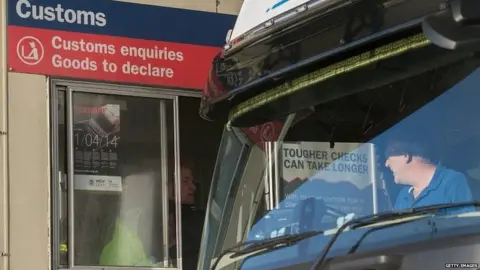Customs union and Brexit: The, a, or c?
 Getty Images
Getty ImagesWhat's in a word? Number 10 will have cheered some of their Brexit backing troops this morning by ruling out, (again), staying in the customs union.
This time they have, for good measure and just to be clear, ruled out not just staying in 'the' customs union, but also remaining in 'a' customs union.
This might sound bonkers to you, but the inclusion of 'a' as a mere possibility had given hope to some MPs that the government was open to the idea of essentially replicating the current arrangements and calling it something else.
An explicit reminder in those terms therefore will be a frustration to that group which have been pushing for a softer approach. In political terms therefore, it is an important signal at the beginning of an important week.
What Sunday's late night statement is not, however, is anything like a new explanation of what the government actually wants to do. It does not mean that there will definitely be a border on the island of Ireland.
It does not mean definitely that there will suddenly be vast lorry parks across the whole of Kent or around the ports at Hull or Holyhead.
The government's overall aims remain the same - no hard border, and trade that is as frictionless as possible after Brexit. But there are emerging signs of the 'c' - the compromise that Theresa May will try to broker with her party, and her cabinet colleagues in the coming weeks to establish the government's actual position.
That is, before of course, Brussels and 27 other countries either say "oui", "non", or "peut-etre".
Back in the summer the UK set out two broad possibilities. The fault line that Theresa May needs to walk carefully over this week is between those in her cabinet who want to crack on as fast as possible with agreeing trade deals with other countries, and those who put the preservation of the existing arrangements above that.
As we saw last week on her trade trip to China, the prime minister does not want to accept publicly that one of these choices trumps the other. But as her colleagues who toured the broadcast studios yesterday displayed, there are divisions in the Tory party over who wants what, so there does have to be compromise.
There are whispers around, as The Times reports, that putting a time limit on to some of the existing arrangements could provide a way through. Interestingly, that's the approach that eventually found favour between Westminster and Brussels over another of the points of contention.
The UK accepted that the European courts would continue to have a role in enforcing the rights of EU nationals who live in the UK, but for a time-limited period of 8 years.
That gave the PM enough wriggle room to contain the wishes of the rest of the EU and her party. Senior figures in Number 10 suggested then the idea of putting time limits could be a useful precedent for other parts of the deal.
This could, perhaps, therefore provide one of the routes out of this tangled part of the Brexit talks. But there are still weeks and months of talking ahead to do.
